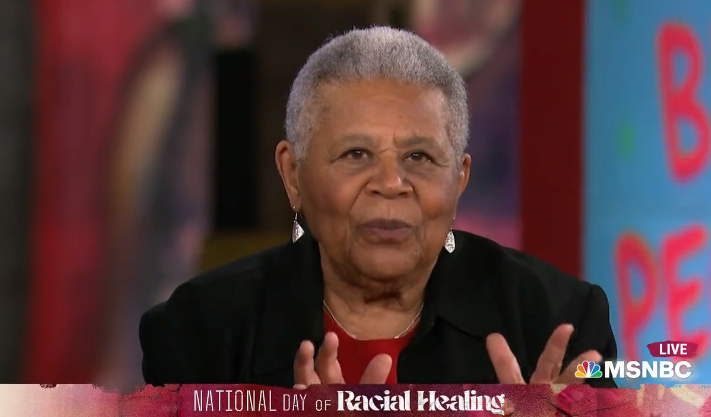
Chris Hayes, Joy Reid and Trymaine Lee took MSNBC viewers to New Orleans Tuesday evening for a live “National Day of Racial Healing” town hall. TVNewser, which just so happens to be based out of New Orleans until July, attended the televised event, which included roughly 300 audience members and was held at Studio BE, an art and event space located in the city’s Bywater neighborhood.
Reid, Hayes and Lee served as co-hosts and were joined for the live MSNBC special—which aired in the 10 p.m. ET hour—by Minnijean Brown-Trickey, activist and member of the Little Rock Nine, Nikole Hannah-Jones, Pulitzer Prize-winning reporter for The New York Times Magazine and creator of the 1619 Project, and White House Infrastructure Coordinator/former New Orleans Mayor Mitch Landrieu, among others.
In addition to witnessing Hayes, Reid and Lee co-host, TVNewser briefly caught up with MSNBC president Rashida Jones at the event and spotted NBC News Group’s svp of DEI Yvette Miley in the studio.
The live studio audience event represented a culmination of an editorial initiative between the NBCUniversal News Group and WK Kellogg Foundation that began in June of last year.
Racism comes in many different forms, of course, and one of the more interesting discussions that took place during the special had to do with gentrification and how infrastructure has in some ways divided communities and accelerated racism. Prior to the construction of Interstate-10 through the middle of New Orleans, for instance, Claiborne Avenue, a major throughfare that cuts through the heart of the city, was a booming area. Drive along Claiborne, which runs parallel to I-10, today and you’ll encounter homeless New Orleanians and poverty.
The Bywater, where the event took place, was a predominately African-American community for decades. The area has become a haven for artists and transplants in recent years (think Williamsburg/Bushwick in Brooklyn), and the cost of living has consequently increased.
Former Mayor Landrieu participated in the special, and he is now the Biden administration’s point person for all things infrastructure. He said the new bill addresses how infrastructure can help some communities that have fallen on hard times, including African-American-majority areas. He conceded, however, there is still a lot of work to be done, noting cities like Miami and New York, not just New Orleans, are places that have been negatively impacted by certain types of infrastructure. This is all a work in progress.
Minnijean Brown-Trickey is of the nine teens who became the first African American students to enter Little Rock Arkansas’ Central High School in 1957, known as “The Little Rock Nine.” She participated in a separate discussion and spoke about activism and the next generation.
“Little Rock’s story usually has one page in American history books for young people,” said Brown-Trickey. “What a denial of our children because it’s so complex that they could learn all about courts, love, violence, persistence and the human spirit. And yet, we deny our children the truth… We have an obligation to give them truth and complexity.”
Michelle MiJung Kim, an Asian-American activist, touched on the recent violence against Asian Americans, saying, “I think we’d be doing injustice to all of our community struggles if we failed to connect the dots back to the 1800s. This is not a new phenomenon where we are living in a state of oppression.”
Dr. Sharon Nazarian, the svp of the Anti-Defamation League and an Iranian-American Jew, spoke about the “weaponization of fear,” saying, “Data shows a lot of Americans believe the conspiracy theories that they read on social media. The fear that we’re all living in today is the fear of the other…and we become more inward turning, we become more isolated and that’s when hatemongers win.”






